Healing amidst the war: Women-led CSOs step up for Libya’s GBV survivors
In the midst of a global pandemic, under-reported crimes often become further obscured, leaving victims in a state of helplessness and disarray. In Libya, where the plague of conflict related sexual violence (CRSV) has been affecting a worrying number of girls and women, local organisations have stepped up to counter the critical challenges posed by COVID-19 and avoid falling prey to the detrimental impact it has had on their previous work. Two civil society organisations in particular, Albayan NGO in Tripoli and Women Union in Sabha, have been exerting even greater efforts to continue providing support and protection to survivors of CRSV, through the UNFPA Women and Girls Safe Spaces (WGSS). They are supported in their action by the EU Emergency Trust Fund for Africa (EUTF Africa) as part of its Gender Based Violence (GBV) prevention and response activities.
Stepping foot into the local centre of Sabha, a small city in southwestern Libya, one does not expect to stumble upon a group of women sitting in silence, focusing on their breath and inner peace. Since the war broke out in 2011, residents of the area have rarely had chances to experience such quiet.
This was without counting on the tireless efforts of a group of women from the Non-Governmental Organisation Women Union, who run the Sabha Women and Girls’ Safe Space (WGSS) supported by the United Nations Population Fund (UNFPA) since 2017.
Bringing light into the darkness
Sabha’s centre provides a safe space where vulnerable women and girls receive psychosocial support in individual and group sessions, and exchange with their peers in a safe and caring environment. They also have access to different training sessions where they acquire livelihood skills and receive information on issues related to women’s rights and health, among other services. “The displacement has made us all under one umbrella,” says Zahra*, one internally displaced woman present at the centre, adding “we all feel each other, our hearts are on each other, we calm each other, and we find safety in our company.”
For an hour and a half each day, the women take part in the Psycho Social Support Sessions, where they share their traumas, hardship and hopes for the future in a safe space. “We cry and complain to each other; we cry over our people who got killed during this crisis, over the destruction that happened to our houses.”
As of June 2020, over 401,836 people had been internally displaced inside Libya (IDPs), a majority of which are females aged between 6 and 50 years old. IDPs and migrant women and girls are particularly vulnerable to rape, forced prostitution and other forms of sexual exploitation and CRSV.
Survivors
With little to no official control over the issue, the situation has been further compounded by the climate of insecurity, sporadic armed conflicts and absence of anti-trafficking legislation or systems across the country. As a result, it has become increasingly difficult to identify and protect survivors of CRSV as women and girls fear prosecution, intimidation or stigma related to their situation, leaving the crimes to remain under-reported or unpunished. “How can I give a future to my girls? I am spending all my money on surviving and rebuilding a house instead of on their education. I am scared for them- they are young and beautiful, you know what I mean…” worries a divorced mother of two teenage girls attending the centre, after having been displaced for the third time.
Against this backdrop, Women and Girls’ Safe Spaces offer crucial and safe entry point to detect cases of survivors of gender-based violence (GBV) who can access lifesaving assistance and care, and receive the help they need to go through the different stages of healing. The psycho-social support women receive contributes to their empowerment, by re-building their self-esteem and raising awareness on their rights, one session at a time. Amidst the darkness, the centres provide a source of joy for women and girls to come together. “We laugh over the tiniest things. We train ourselves on meditation, and we pray to Allah to make us brave and for this war to pass with the least loss,” Zahra explains. “They make death outside, while we make life here inside,” says Farah, who has been internally displaced attending the activities at one of the WGSS.
To date, more than 12,720 women and girls have benefitted from the WGSS services in Tripoli and Sabha ranging from psychological support and protection services for GBV survivors and women and girl at risk, to strengthening resilience by facilitating vulnerable women’s access to the labour market.
Stronger Together: Undeterred by COVID-19 challenges
With stay-at-home restrictions imposed by the recent pandemic, human rights and women’s associations have warned against an increase in GBV, especially related to intimate partner violence/domestic violence. Women and girls already in vulnerable and/or abusive situations have become further exposed to their potential abusers, with limited recourse for support. Afaf Elwalwal, founder of the AlBayan NGO running the Tripoli centre, acknowledges that: “As everyone else, when we first heard about the coronavirus, we were all worried about how this could affect us and our communities.”
Following the implementation of preventive measures related to the COVID-19 pandemic in March 2020, the Safe Spaces have adopted remote modalities of service provision to ensure continuity of psychosocial support and case management services as well as raise awareness of gender-related issues through social media platforms. But other problems arose. “AlBayan is a community-based services centre where we do many capacity building and livelihood trainings for women and girls but a lot of people were not able to find any masks, gloves or sanitizers, some couldn’t even afford them,” Afaf remembers.
Eager to continue providing support to these women in spite of the difficult safety requirements, the NGO followed the UNFPA’s suggestion to train and equip beneficiaries in the manufacturing of protective face masks. “It was very much welcomed as AlBayan usually trains women on sewing as part of its livelihood trainings,” Afaf recounts, explaining that the NGO received advice from a local medical factory which taught them how to keep the masks sanitised and safe to use.
Gain respect
Within two weeks, 15 women had been trained, producing over 500 masks for the local community, heath workers and migrants. The numbers have kept growing since, with over 3,000 masks produced by beneficiaries from AlBayan and Women Union in compliance with WHO guidelines.
“During a crisis, people are exposed to more vulnerability and it is important for NGOs to take the lead in the response. We use events like this to reach out to more people on the streets to tell them about the services we are providing, which has helped us gain more respect from the local community as women individuals who are responding to the COVID-19 outbreak in Libya,” Afaf concludes.
This action is implemented as part of the North of Africa window of the European Union Emergency Trust Fund for stability and addressing root causes of irregular migration and displaced persons in Africa (EUTF for Africa), the EU’s main tool for actions to support migration related issues in Libya. Since its establishment in November 2015, EUTF for Africa has mobilised over 408 million euros in projects across Libya, with a specific focus on protection and assistance, stabilisation of municipalities and integrated border management.
*Names have been changed for privacy issues




























 Syria
Syria 







